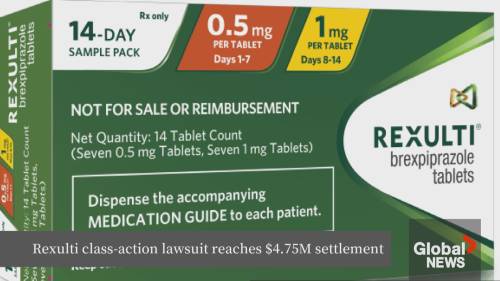After years of legal battles and patient testimonies, the landmark class action lawsuit against pharmaceutical giants Otsuka and Lundbeck over their antipsychotic medication Rexulti has concluded with a $4.75 million settlement for Canadian patients. The resolution marks a significant victory for hundreds who claimed the drug caused compulsive behaviors that devastated their finances and relationships.
The settlement, approved by the Ontario Superior Court last week, will compensate patients who developed pathological gambling, hypersexuality, compulsive shopping, and binge eating behaviors while taking the medication between 2018 and 2022. These impulse control disorders allegedly emerged without warning, as plaintiffs maintained the drug’s labeling failed to adequately disclose such serious potential side effects.
“This settlement acknowledges the profound suffering of patients who trusted their medication to help them, only to find themselves battling destructive compulsions they couldn’t control,” said Margaret Chen, lead counsel for the plaintiffs. “Many lost their life savings, marriages, and dignity before connecting their behaviors to the medication.”
Rexulti, approved in Canada in 2017 for schizophrenia and as an add-on treatment for major depressive disorder, works by affecting dopamine and serotonin receptors in the brain. While effective for many patients with serious mental health conditions, the lawsuit alleged the dopaminergic properties of the drug triggered reward-seeking behaviors in a subset of users.
According to court documents, one plaintiff, identified only as J.M., lost over $300,000 to gambling within six months of starting Rexulti—despite having no prior history of gambling. Another developed such severe hypersexuality that it destroyed their 15-year marriage before their physician recognized the connection to the medication.
The manufacturers, while agreeing to the settlement, have not admitted liability. Their statement emphasizes that “the decision to settle reflects a desire to avoid prolonged litigation costs rather than an acknowledgment of the claims.” The companies have since updated Rexulti’s product monograph in Canada to include more prominent warnings about impulse control disorders.
The settlement fund will be distributed based on the severity of impacts experienced, with compensation ranging from $7,500 to $40,000 per claimant. Patients who believe they qualify have until September 2024 to submit claims documenting their use of the medication and resulting behaviors.
Dr. Amrita Sandhu, a psychiatrist not involved in the litigation, told CO24 News that this case highlights the challenging risk-benefit calculations in psychiatric treatment. “These medications can be life-changing in positive ways for people with serious mental illness. But we must be vigilant about monitoring for unusual side effects and ensuring patients are fully informed of all potential risks.”
Health Canada has confirmed it continues to monitor the safety profile of Rexulti and similar medications. The agency has reported receiving 78 adverse event reports related to impulse control disorders potentially linked to the drug since its approval.
The Canadian healthcare system spends approximately $280 million annually on antipsychotic medications like Rexulti, according to the Canadian Institute for Health Information. These treatments remain an essential component of psychiatric care despite recognized side effects.
As patients begin receiving compensation, questions linger about the pharmaceutical industry’s responsibility in drug safety monitoring. When do manufacturers know about serious side effects, and how quickly should they be required to communicate these risks to patients and healthcare providers? The balance between bringing effective treatments to market and ensuring complete transparency about potential harms remains a contentious issue in health policy debates.










